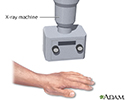Joint x-ray
X-ray - joint; Arthrography; Arthrogram
This test is an x-ray of a knee, shoulder, hip, wrist, ankle, or other joint.
How the Test is Performed
The test is done in a hospital radiology department or in the health care provider's office. The x-ray technologist will help you position the joint to be x-rayed on the table. Once in place, pictures are taken. The joint may be moved into other positions for more images.
How to Prepare for the Test
Tell your provider if you are pregnant. Remove all jewelry before the x-ray.
How the Test will Feel
The x-ray is painless. It may be uncomfortable to move the joint into different positions.
Why the Test is Performed
The x-ray is used to detect fractures, tumors, or degenerative conditions of the joint.
What Abnormal Results Mean
The x-ray may show:
- Arthritis
- Fractures
- Bone tumors
- Degenerative bone conditions
- Osteomyelitis (infection of the bone)
The test may also be performed to find out more about the following conditions:
- Acute gouty arthritis (gout)
- Adult-onset Still disease
- Caplan syndrome
- Chondromalacia patellae
- Chronic gouty arthritis
- Congenital dislocation of the hip
- Fungal arthritis
- Non-gonococcal (septic) bacterial arthritis
- Osteoarthritis
- Pseudogout
- Psoriatic arthritis
- Reiter syndrome
- Rheumatoid arthritis
- Runner's knee
- Tuberculous arthritis
Risks
There is low radiation exposure. X-ray machines are set to provide the smallest amount of radiation exposure needed to produce the image. Most experts feel that the risk is low compared with the benefits. Children and the fetuses of pregnant women are more sensitive to the risks of the x-ray. A protective shield may be worn over areas not being scanned.
References
Contreras F, Perez J, Jose J. Imaging overview. In: Miller MD, Thompson SR, eds. DeLee, Drez, & Miller's Orthopaedic Sports Medicine. 5th ed. Philadelphia, PA: Elsevier; 2020:chap 7.
Kapoor G, Toms AP. Current status of imaging of the musculoskeletal system. In: Adam A, Dixon AK, Gillard JH, Schaefer-Prokop CM, eds. Grainger & Allison's Diagnostic Radiology: A Textbook of Medical Imaging. 7th ed. Philadelphia, PA: Elsevier; 2021:chap 38.
Review Date: 4/27/2023
Reviewed By: Linda J. Vorvick, MD, Clinical Professor, Department of Family Medicine, UW Medicine, School of Medicine, University of Washington, Seattle, WA. Also reviewed by David C. Dugdale, MD, Medical Director, Brenda Conaway, Editorial Director, and the A.D.A.M. Editorial team.















